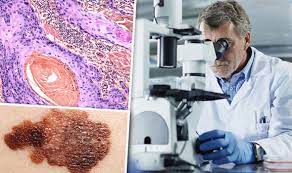UK scientists develop new “wonder” drug that offers breakthrough treatment of deadly cancer

London: Scientists in the United Kingdom have welcomed a “truly wonderful” new drug for a hard-to-treat and aggressive form of cancer. According to The Guardian, researchers at the Queen Mary University London said their new treatment “quadrupled” three-year survival rates and increased average survival by 1.6 months. They also added that the new drug, which works by cutting off the tumour’s food supply, is the first of its type for mesothelioma in 20 years. The results were published in the journal JAMA Oncology.
Mesothelioma is a type of cancer that develops in the lungs and is mainly caused by exposure to asbestos at work. It is aggressive and deadly and has one of the world’s worst cancer survival rates. Thousands of people are diagnosed with the disease globally and according to the official figures, there are about 2,700 new cases of mesothelioma each year in the UK.
Researchers at Queen Mary University of London conducted an international trial spanning five countries – the US, the UK, Australia, Italy and Taiwan. For the study, led by Professor Peter Szlosarek at Queen Mary, the team saw all patients receive chemotherapy every three weeks for up to six cycles. Half of them were injected with the new drug ADI-PEG20 (pegargiminase), while the other half received a placebo for two years.
Among the patients included in the final analysis were 249 people with pleural mesothelioma – when the disease affects the lining of the lungs. They had an average age of 70.
The ATOMIC-meso trial was conducted at 43 centres across five countries between 2017 and 2021. Patients involved in the study were followed up for at least a year. Those who received pegargiminase and chemotherapy survived for an average of 9.3 months, compared to 7.7 months for those who had the placebo and chemotherapy, as per the study.
The average “progression-free survival” was 6.2 months with pegargiminase-chemotherapy, compared with 5.6 months among patients who had the placebo and chemotherapy, researchers said.
“In this pivotal, randomised, placebo-controlled, phase 3 trial in 249 patients with pleural mesothelioma, pegargiminase-chemotherapy increased significantly the median overall survival by 1.6 months and quadrupled the survival at 36 months compared to placebo-chemotherapy,” the authors wrote.
“Pegargiminase-based chemotherapy was well tolerated, with no new safety signals,” they added.
According to the researchers, this is the first successful combination of chemotherapy with a drug that targets cancer’s metabolism developed for this disease in 20 years. The new drug works by depleting arginine levels in the bloodstream. For tumour cells that cannot manufacture their own arginine, this means their growth is thwarted.
“It’s truly wonderful to see the research into the arginine starvation of cancer cells come to fruition,” Professor Szlosarek said. “This discovery is something I have been driving from its earliest stages in the lab, with a new treatment, ADI-PEG20, now improving patient lives affected by mesothelioma,” he added.





